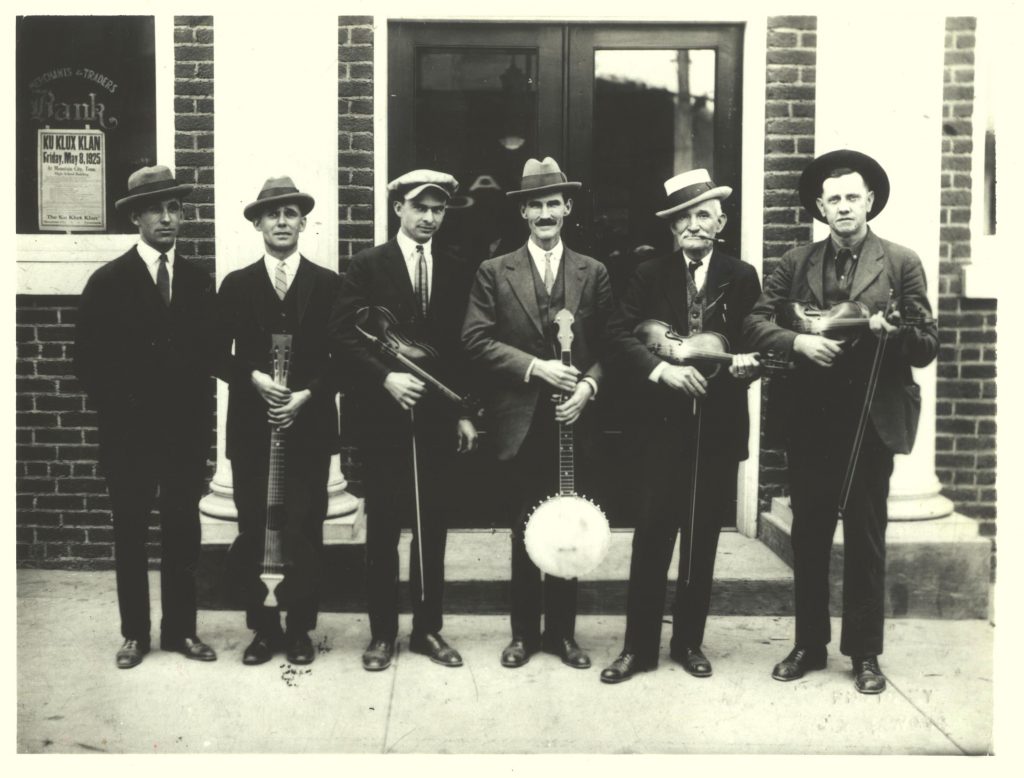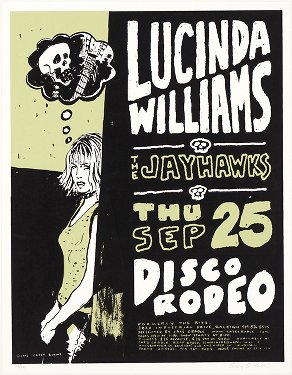 The SFC has taken yet another step into the 21st century with the creation of our first digital collection, The Casey Burns Collection. (To view digital images, just click the call number link in the finding aid).
The SFC has taken yet another step into the 21st century with the creation of our first digital collection, The Casey Burns Collection. (To view digital images, just click the call number link in the finding aid).
The collection features posters designed and printed by poster artist and illustrator Casey Burns, a native of North Carolina and graduate of UNC-Chapel Hill. The posters were created between 1997 and 2006, primarily for Chapel Hill area venues Cat’s Cradle, Local 506, and Go!, and include announcements for Tift Merritt, Two Dollar Pistols, Southern Culture on the Skids, Lucinda Williams (pictured, OP-20415/28), and many others.
Jamie
Photo of the Week: 1925 Fiddler's Convention
Irish Fiddlers in the Kevin Delaney Collection
 From 1970 to 1974 Kevin Delaney, a Duke University graduate with a keen interest in folk music, traveled across Ireland and the United States recording scores of local fiddlers and old-time musicians, including many whose music may have otherwise gone undocumented.
From 1970 to 1974 Kevin Delaney, a Duke University graduate with a keen interest in folk music, traveled across Ireland and the United States recording scores of local fiddlers and old-time musicians, including many whose music may have otherwise gone undocumented.
These field tapes, now preserved in the SFC’s Kevin Delaney Collection, contain hundreds of tunes performed by traditional Irish musicians, primarily fiddlers from the counties of Clare, Donegal, Dublin, Galway, Kerry, Meath, Sligo, and Tipperary, as well as Irish fiddlers working in the US. The collection is an invaluable resource for students of Irish and American fiddling traditions.
Listen below to clips of Irish fiddler John Kelly, of Dublin, performing a tune recorded by Delaney as “The Humours of Castlefinn” on July 31, 1972:
Humours of Castlefinn
and Paddy Glacken, also of Dublin, performing “The Apples in Winter” a few days later:
Apples in Winter
Both clips from field tape FT-272 in the Kevin Delaney Collection.
The Crime At Quiet Dell
In August of 1931, police arrested a Quiet Dell, West Virginia shopkeeper named Harry Powers on suspicion of murder. Powers had been exchanging love letters with an Illinois widow who had responded to a “lonely hearts” ad he had posted under the pseudonym Cornelius O. Pierson, and the widow was now missing. Police searching his garage found blood stains and a noose, prompting them to excavate a drainage ditch near Powers’ yard. In the ditch were found the bodies of the widow, her three children, and another woman who had answered Powers’ personal ad.
News of the sensational murders quickly swept the country (Powers was called “The Bluebeard of Quiet Dell”), and West Virginia song publishers Leighton D. Davies and A.H. Grow were quick to capitalize with a murder ballad, “The Crime At Quiet Dell”. In an apparent attempt to convince fellow West Virginians their venture was not purely exploitative, they wrote:
… it was not written to appeal to the morbid fancies of some at all, but altogether to the contrary. (The scene has been carefully viewed, and every possible detail of the gruesome crime learned on the ground first hand). It is designed to put right the idea that some people in other states may possibly entertain, that West Virginia is not a good State.
The ballad was published and performed live on West Virginia radio stations prior to Powers’ trial, to the great consternation of his lawyer. Powers was unsurprisingly convicted and hanged for his crimes on March 19, 1932.
More on “The Crime at Quiet Dell” can be read in Donald Lee Nelson’s article in the Winter 1972 issue of JEMF Quarterly, which also contains a complete reproduction of the original sheet music (above) from the Southern Folklife Collection Sheet Music and Song Lyrics Collection.
Photo of the Week: The Kentucky Girls
 The Kentucky Girls, ca. 1928. At least two different duos went by this name in the late ’20s: sisters Jo and Alma Taylor performed as The Kentucky Girls on Cincinnati area radio stations, while a mother and daughter group from Missouri used the same name on KMBC in Kansas City.
The Kentucky Girls, ca. 1928. At least two different duos went by this name in the late ’20s: sisters Jo and Alma Taylor performed as The Kentucky Girls on Cincinnati area radio stations, while a mother and daughter group from Missouri used the same name on KMBC in Kansas City.
People had children at an earlier age back then, but it seems safe to say this is a photo of the sister act from Cincinnati.
New Addition: The David Holt Collection
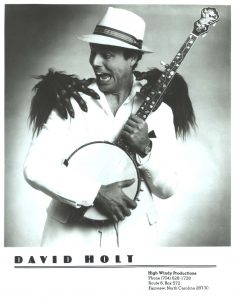 The SFC is proud to announce our latest addition: The David Holt Collection, containing material relating to the career of musician, storyteller, and historian of Appalachian music David Holt. The collection includes correspondence, photographs, and press clippings documenting four decades of Holt’s performing career, as well as audio-visual material relating to the many television and radio shows he has hosted since the 1980s, including TNN’s Fire on the Mountain and American Music Shop, Public Radio’s Riverwalk Jazz, and UNC-TV’s long-running Folkways program.
The SFC is proud to announce our latest addition: The David Holt Collection, containing material relating to the career of musician, storyteller, and historian of Appalachian music David Holt. The collection includes correspondence, photographs, and press clippings documenting four decades of Holt’s performing career, as well as audio-visual material relating to the many television and radio shows he has hosted since the 1980s, including TNN’s Fire on the Mountain and American Music Shop, Public Radio’s Riverwalk Jazz, and UNC-TV’s long-running Folkways program.
The collection also contains documentation relating to Holt and Doc Watson’s 2002 Grammy award winning album of performance and conversation, Legacy.
Listen below to clips from the Legacy album (SFC CD-7936), wherein the old friends discuss the proper term for a guitar-banjo hybrid instrument and Holt plays his arrangement of “Don’t Get Weary”:
bantar vs gitjo
Don’t Get Weary
Photo of the Week: Johnny Cash and the Tennessee Two
Dr. Demento and John Fahey Interview Son House
 On May 7, 1965, UCLA students Barry Hansen (who, as you know, would later find fame as radio’s Dr. Demento) and John Fahey (already an accomplished guitarist), along with Mark Levine, sat down for an interview with legendary Delta blues singer Son House in Venice, California. House, who had recorded some extremely influential sides for Paramount records in the 1930s before disappearing from the blues scene for almost a quarter of a century, had recently been “rediscovered” and at the time was widely regarded as the greatest Delta blues singer still actively performing (watch him sing “Death Letter” here to see why).
On May 7, 1965, UCLA students Barry Hansen (who, as you know, would later find fame as radio’s Dr. Demento) and John Fahey (already an accomplished guitarist), along with Mark Levine, sat down for an interview with legendary Delta blues singer Son House in Venice, California. House, who had recorded some extremely influential sides for Paramount records in the 1930s before disappearing from the blues scene for almost a quarter of a century, had recently been “rediscovered” and at the time was widely regarded as the greatest Delta blues singer still actively performing (watch him sing “Death Letter” here to see why).
The interview has been preserved on field tape FT-2809 in the SFC’s John Edwards Memorial Foundation Collection. Many of the questions focus on House’s early career in Mississippi and memories of his blues contemporaries. In the clip below House explains the origins of Charley Patton‘s song “Charlie Bradley’s Ten Sixty-Six Blues”:
SonHouse
Photo of the Week: Big Slim McAuliffe
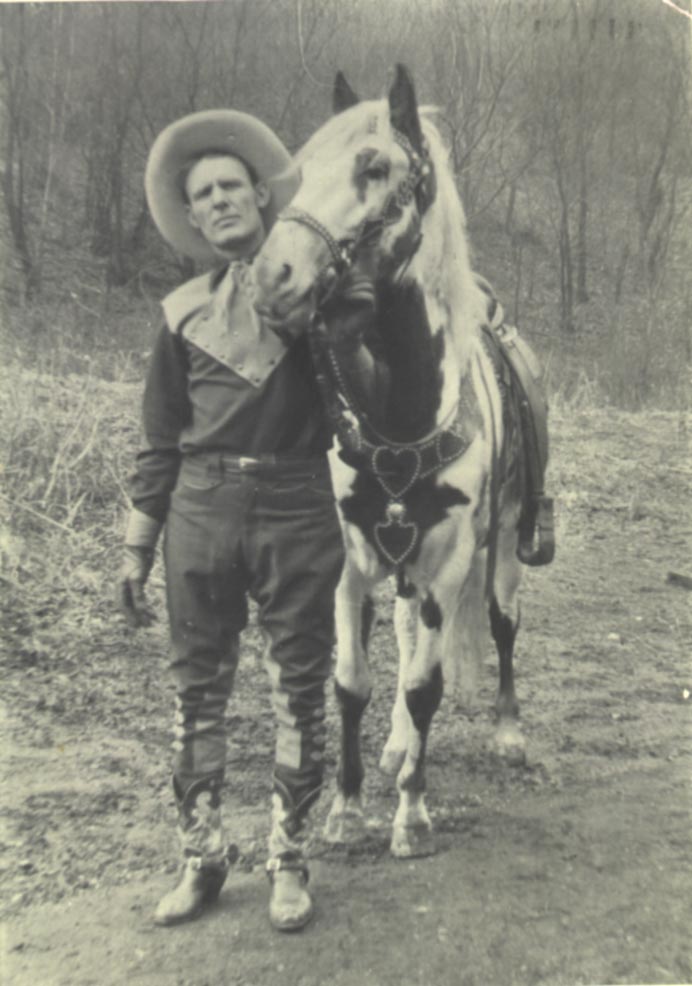 Big Slim McAuliffe, a featured performer on Wheeling, West Virginia’s WWVA Jamboree in the ’30s and ’40s. On the verso of this ca. 1938 photo, sent as a postcard from Wheeling to a (presumably) young fan in Moundsville, W.V., is printed:
Big Slim McAuliffe, a featured performer on Wheeling, West Virginia’s WWVA Jamboree in the ’30s and ’40s. On the verso of this ca. 1938 photo, sent as a postcard from Wheeling to a (presumably) young fan in Moundsville, W.V., is printed:
Hello folks,
I want to thank you for the support you give me on my Coco Wheats program and I sure hope you like this picture. My horse is a genuine registered Arabian stallion. I think he is the finest high school horse in the country and he does all kinds of tricks. I hope you will get to see us in person sometime. Thanks a million, million ways for your support and I hope you’ll continue to eat Coco Wheats.
Big Slim, The Lone Cowboy
Dr. Demento On The Old-time Record Review
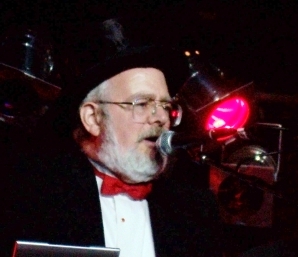
On Friday, February 26th, the Southern Folklife Collection will be hosting legendary broadcaster Barry Hansen, aka “Dr. Demento”, longtime host of the nationally syndicated Dr. Demento Show. He will be presenting a lecture and spinning records on the subject of “Humor in the 20th Century: Country and Blues”. The program begins at 5:45 in Wilson Library’s Pleasants Family Assembly Room, to be preceded by a reception at 5:00, and is free and open to the public.
Mr. Hansen should have much to say on the subject of humor in country and blues music, as before he adopted his Dr. Demento persona to become radio’s greatest spinner of humorous songs he was a young musicology student at UCLA, the original home of the John Edwards Memorial Foundation. In the mid-sixties he began his radio career as the host of the “Old-time Record Review”, a scholarly program devoted to the folk, blues, and country music collected by the JEMF. When the JEMF Collection moved to UNC to become the basis of the Southern Folklife Collection , so too did open-reel tapes of 39 episodes of “Old-time Record Review”.
Listen below to a clip of novice DJ Barry Hansen introducing Hank Williams’ “Mind Your Own Business”, from a 1965 episode of “Old-time Record Review” (SFC# FT-1616):
Hansen

